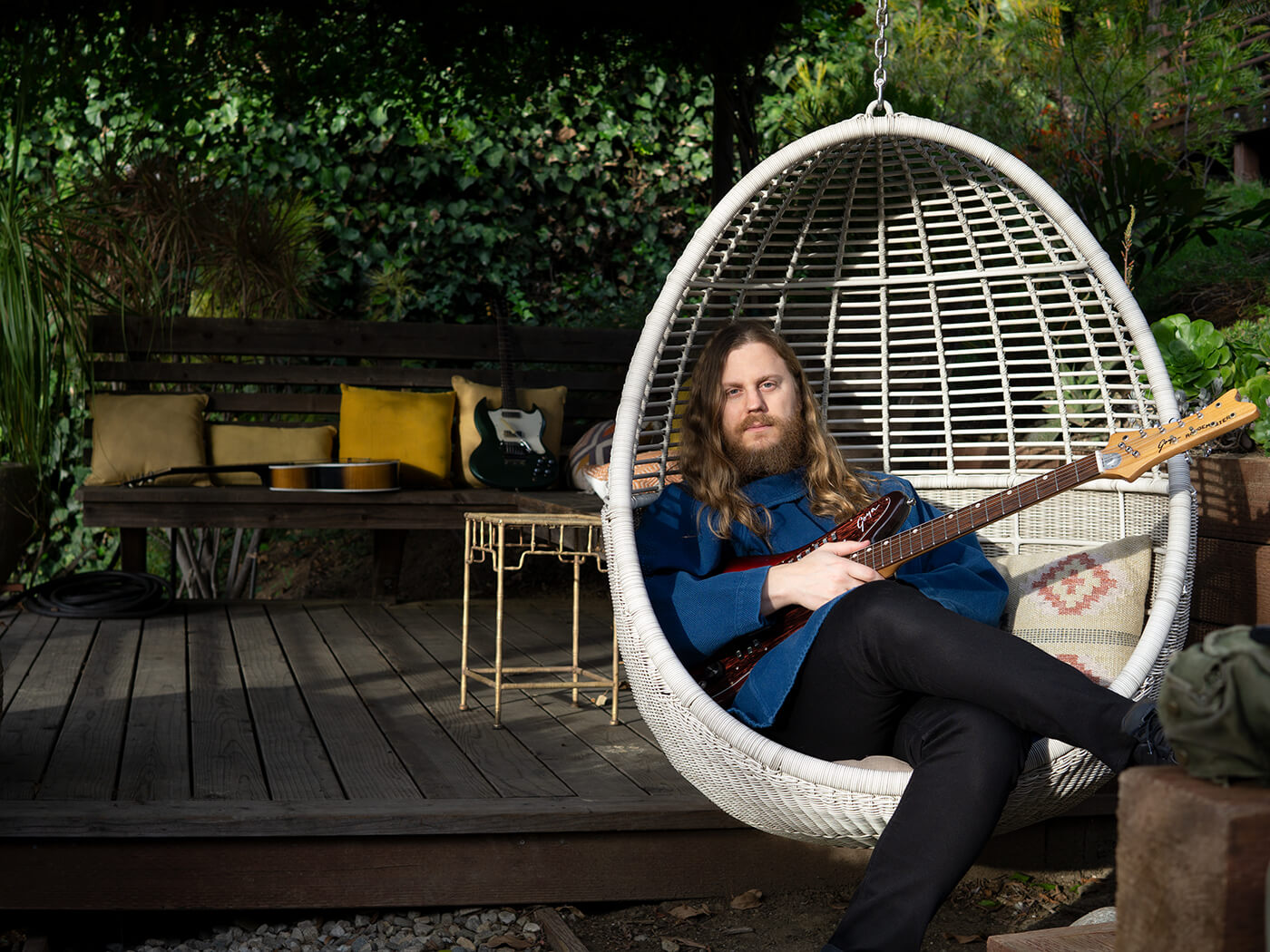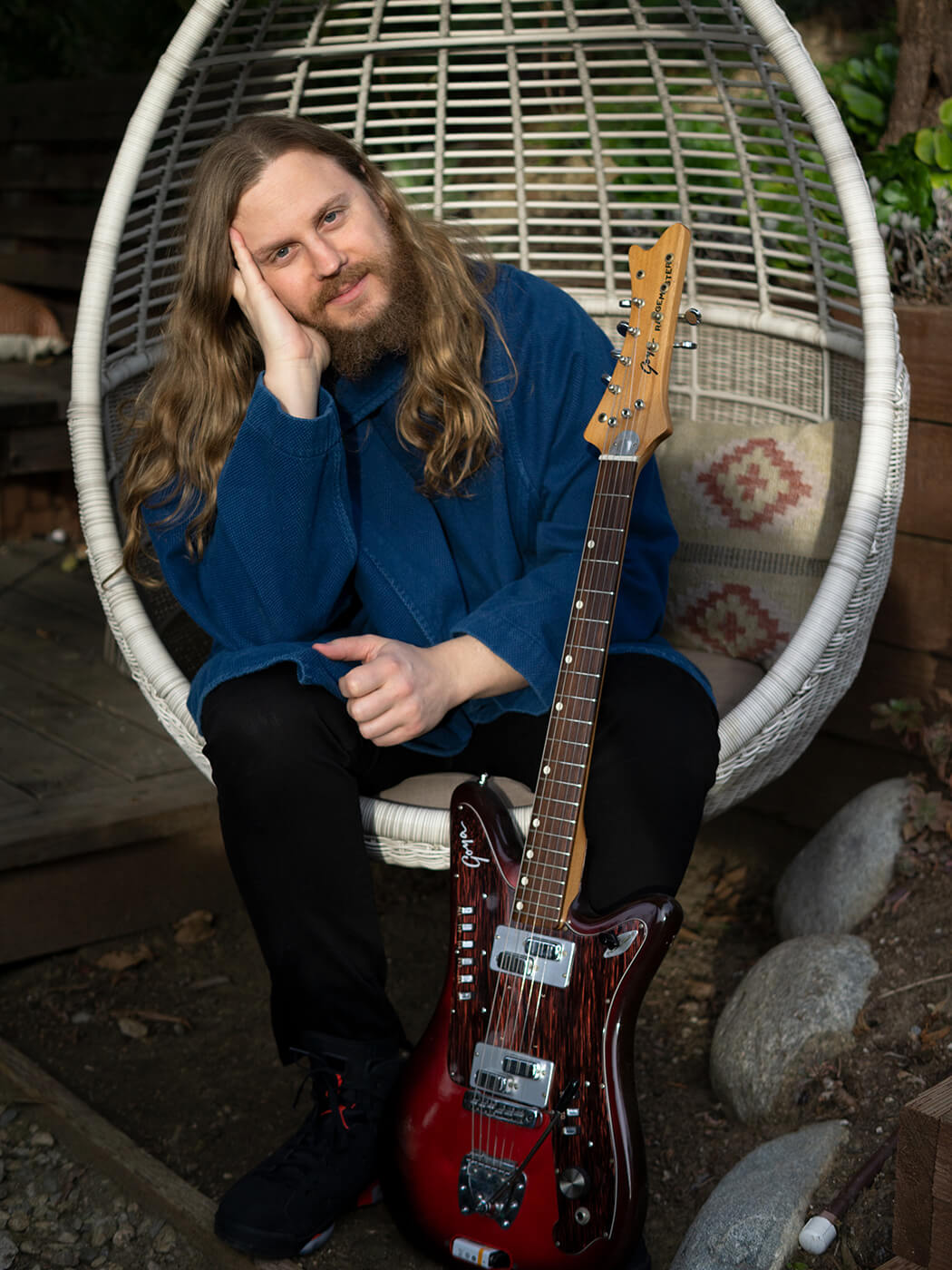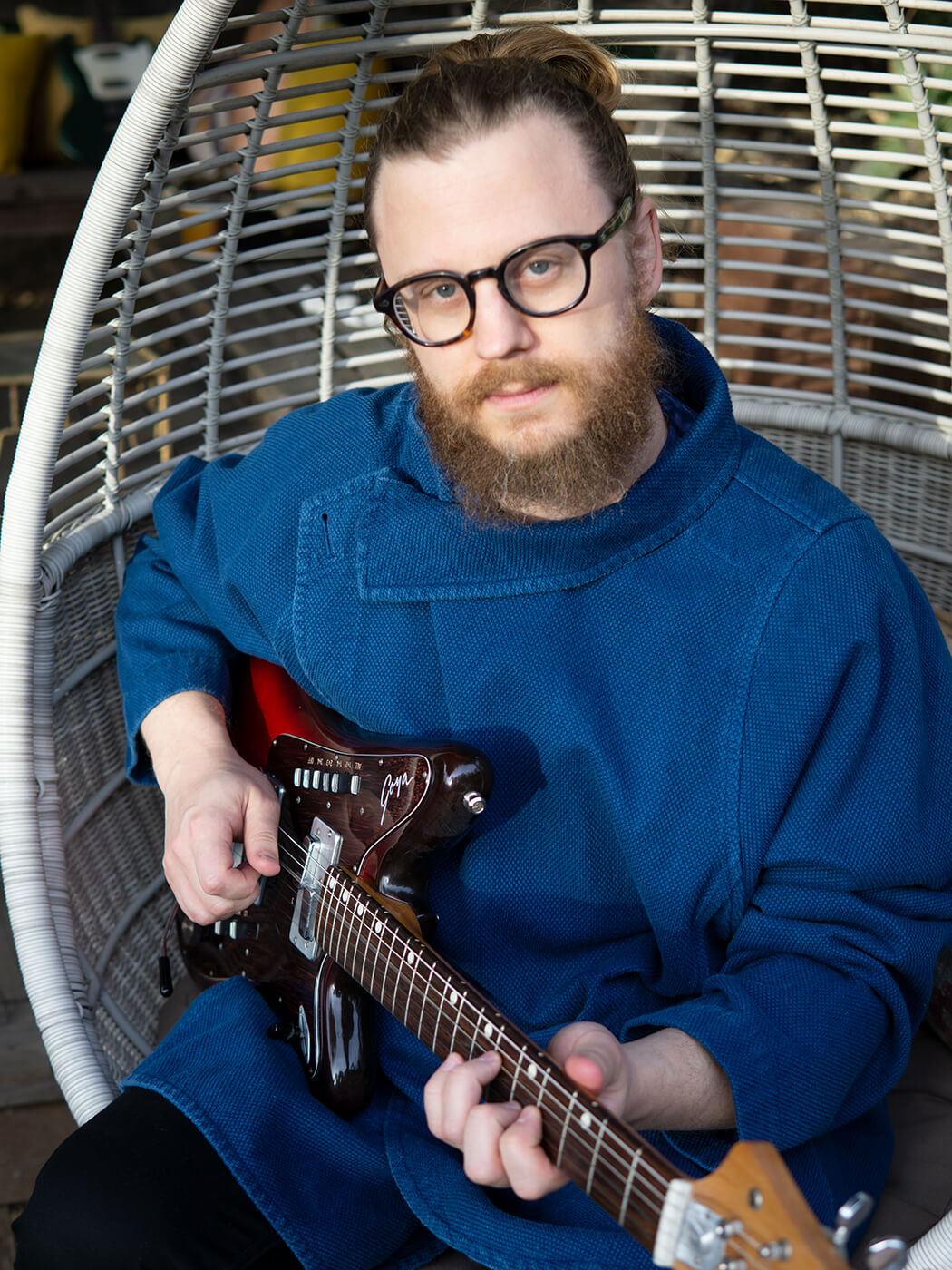How SNL guitarist Jared Scharff became the man behind some of the biggest chart hits of the last two years
From DaBaby to Machine Gun Kelly some of the most streamed songs of the last 12 months were masterminded by a guitar nerd most know for being in the background of Saturday Night Live every week. We caught up with Scharff to look back, and forward.

All images: Andy Alt
For the best part of four decades, Saturday Night Live has remained one of the most popular and influential shows on US TV. Since the late-night comedy showcase debuted 1975, only five guitar players have occupied the full-time guitarist’s chair in the Saturday Night Live Band: hot-shot musicians who perform the show’s opening and closing themes, provide backing music to sketches, and incidental music to keep the whole thing moving – all live of course. For the last 13 years, that chair has been occupied by Jared Scharff – the New York University grad stepped into one of the most coveted and demanding gigs in the session world – one that requires exhaustive and relentless prep, while also requiring your sight reading and improv chops to be first rate.
Scharff got the SNL gig while he was still in his twenties, and in the years since has become a fixture in the background on the show – ripping soulful solos as a featured player between segments, providing musical accompaniment and counterpoint during sketches, and backing up megawatt guest artists like Mick Jagger and Jeff Beck, often with a boutique guitar in hand to make watching guitar nerds nod approvingly.
But despite it being one of the most high-profile gigs around, Scharff recently announced that he would be leaving the show to pursue other ventures. So what would cause a musician to walk away from a prestigious and steady job in the midst of a pandemic? Well, the answer lies in his extracurricular pursuits: for the last few years Scharff has been quietly moonlighting a hit-making producer and co-writing whiz with a resume of chart-topping pop and hip-hop albums and singles under his belt.

In the last two years alone, Scharff has contributed to (either under his own name or as part of Queen Sixties, the production team he co-founded with Fitz and the Tantrums bassist Joe Karnes and keyboardist Jeremy Ruzumna) four albums which debuted at No.1 on the Billboard charts (Da Baby’s Kirk, Trippie Redd’s A Love Letter To You 4, Machine Gun Kelly’s Tickets to My Downfall and Lil Baby’s RIAA Album of the Year, My Turn) and anchored massive hit singles like Post Malone and Tyla Yaweh’s Tommy Lee and Iann Dior’s Gone Girl – the latter of which currently boasts over 181 million streams on Spotify.
“SNL was an amazing experience!” Scharff tells us from his home in LA, having recently moved full time from New York to focus on his production work. “It was so incredible playing with that world-class band and getting to laugh like that for 21 shows a year, so what I’m about to say means no disrespect to the gig or show, but being a guitar player in the band on a comedy show was never what I dreamt of.
“The same year I got the SNL gig I also started co-writing and producing other people. I realized then that I wanted to be involved in making the songs that people sing at full volume in their cars, or listen to when they’re sad, or hype themselves up to before going out for the night. I wanted to make the songs that life happens to. My dream was always to touch a huge number of people and affect emotions through music in the same way it always affected me. SNL was the best job, but it wasn’t giving me that.”
Power pop
When you look at Jared’s chart-topping credits, what leaps out is that many of them are in genres – such as hip-hop and R&B where the guitar is not really the focal point. In recent years however, guitar has become a more common feature across the gamut of popular music – as a guitar player who has been heavily involved in this world, his take on this evolution is intreresting.
“The role of guitar in pop music has always changed cyclically,” Scharff affirms. “When I first started working on hip-hop records years ago, guitar just wasn’t being used. It was all synth-driven, so I would come in with a bag of pedals and make the guitar like a synth. That was considered very different at the time. The guitar is popular again, but the synths haven’t gone away, and they never will. If you’re doing modern pop, you have to be able to adapt to trends and changes. You’ve got to adapt and constantly be moving and changing while still doing what’s authentic to you.”
So how exactly does one find the time to tend to an increasingly busy production career in tandem with the demands of a major gig like the SNL Band? Scharff’s ability to work from anywhere has something to do with it and many of his most successful contributions as a songwriter and producer were born from the humble beginnings of solo bedroom jams, starting life as guitar loops and song sketches he records at home and then bundles into packs which are sent out to his network of co-producers, beatmakers, and songwriters.
“Things have become very fragmented and everyone has to be a specialist in something,” Scharff says of the process. “It’s like a factory where a bunch of specialists do their thing separately and come together through their respective networks to build these songs.” While there’s plenty of remote collaboration involved, Scharff has developed a remarkably self-contained process (even prior to the pandemic) and has enjoyed a lot of flexibility because of it. On the gear side he’s equally flexible – blending his tried and true guitars and pedals (including his signature Walrus Audio Kangra fuzz) with that most modern of session guitar staples, a Kemper Profiler.
Scharff’s “nothing’s precious” attitude towards equipment has served him well. For example, the lead instrumental hook heard on the final version of Dominic Fike’s Phone Numbers was tracked casually in Scharff’s living room using a Yamaha guitalele into his iPhone’s Voice Memos app, then sauced up, edited, and mixed in ProTools. “Once the guitar idea was there, it was sent off to my frequent collaborator Kenny Beats who asked me for ‘toy-like’ guitar ideas.”
“All you need is a good idea and knowing how to make it sound great,” Jared explains. “That doesn’t require $100 million worth of gear, but you do have to develop an ear for what sounds good. Knowing how to use your DAW properly and understanding basic mixing fundamentals helps a lot and is more important these days than fancy gear. Also, new pedals are a huge source of inspiration for me; I love plugging in a random pedal and finding sounds that inspire songs.”

Broad church
Another string to Scharff’s bow is the chamelonic nature of his playing. The ability to move between styles, genres and vibes effectively was a huge part of his job at SNL, and while many guitarists are preoccupied with ‘finding their voice’ on the instrument, for Scharff this versatility has paid dividends both as a guitarist and a writer/producer.
“I’ve always loved variety and I want to continue wearing lots of hats,” he agrees. “The irony of coming off the SNL gig is that the whole job was really about morphing between different styles and versatility! I’m the type of guy that will listen to a full Grateful Dead bootleg and then immediately switch to a brand-new hip-hop release or classic rock or candy pop stuff. I listen to and enjoy everything, which is why I legitimately love working with all kinds of artists.
“I think it’s important to avoid being known for one signature sound because that can be hard to escape. I’d say my writing and creating with the guitar and pulling the emotion out of guitar ideas, but with good taste and tone, is my overall thing. Knowing what’s too much and what’s too little is extremely important. I think having those sensibilities is a real strength of mine as a producer and I’m able to have my soul in the music and it’s never just the guy from SNL shredding – unless someone asks for that! All the years on SNL really helped me hone my versatility because you have to pull off so many different styles convincingly on that show.”
While embracing versatility may go a long way in netting work in today’s turbulent musical landscape, Scharff also has an uncanny knack for penning memorable, singable guitar hooks. It’s a skill he honed with his Pearl Lion instrumental side project, buth has proven to be another secret weapon when applied to his work in the pop realm. Scharff’s particularly proud of the riff featured on Iann Dior’s Gone Girl as it’s “immediately identifiable and plays a big role in the song’s overall composition.”
And in the case of his recent collaboration with Machine Gun Kelly, Scharff found the guitar to be more than just a creative vehicle, but something to bond over: “I was in the studio with MGK one night and a bunch of other really great guitarists – including Omer Fedi, Nick Long and Kthrash,” he recalls. “MGK was using my baritone guitar to record a part that I had come up with, and I was showing him the different chord inversions I was using for the part while we swapped guitar ideas. It was just the two of us in the live room. MGK is a great guitarist, so it was just really cool to have that kind of solo guitar moment together with such a big artist. And there was a really great energy in the studio with all of these talented guitarists around. Those one-on-one creative moments with artists where the two of you split off during a session are always really fun and kind of rare.”
It’s Saturday Night
With his years on SNL now rapidly receding into the rear view as he takes on more and more production and writing work, Scharff has few regrets about leaving the gig that he called home for over a decade – and it’s one that has left him with some great memories of his time there.
“Them Crooked Vultures were the musical guest on one show, and the SNL band plays cover songs as warm-ups,” Sharff recalls. “We were playing Out On The Tiles by Led Zeppelin that night and Dave Grohl had heard us do it during dress rehearsal and came out to watch. For the live performance, we did it again, so I’m standing out in front of the band center stage as a feature and Grohl brings out John Paul Jones to watch! I’ve got Dave Grohl and John Paul Jones standing ten feet in front of me as I’m playing a Zeppelin song and taking solos and I was just losing my shit inside – totally freaking out! That was wild.
“The other big one was when Mick Jagger hosted: Mick did a blues tune with Jeff Beck and the SNL Band backed them up. Beck’s band played with us, so it was a really big band and Jeff Beck’s out there taking a solo and I’m just freaking out about how crazy it is to be playing music with Mick Jagger and Jeff Beck. Mick is stalking the stage as he does during Beck’s solo and as he’s walking back to the front, he looks back at me and we lock eyes and he gives me this grin that just says ‘This is the shit, isn’t it kid?!’ I just smiled and laughed and he laughed, turned his head, and he was gone, back out into Mick Jagger land.
“That quick connection was just a couple of seconds, but it felt like time stopped. It was amazing to have shared that moment with him. Working on the show itself, these musical moments and many others, playing with that killer band all the time, and especially the opportunities and relationships SNL opened up for me… it’s all still sinking in. How truly lucky I was to get that gig and what an insane ride it’s been. It was a once-in-a-lifetime experience and I’m so grateful and thankful for it.”
Follow Jared on Instagram at @scharffishere.
